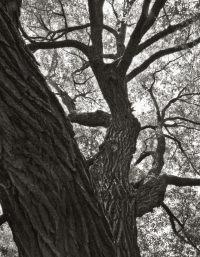|
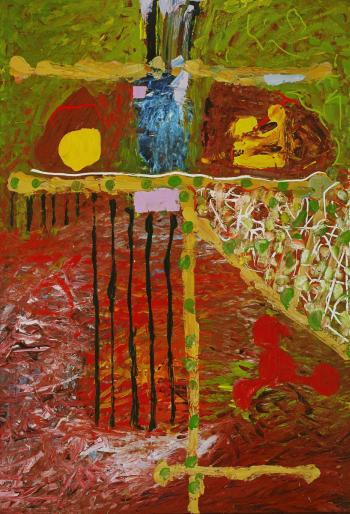
Last Garden (Fall)
Harold Town
b. June 13, 1924,
_______________________
This Compost
Walt Whitman
from Leaves of Grass
(....)
What chemistry!
That the winds are really not infectious,
That this is no cheat, this transparent green-wash of the sea which is so amorous after me,
That it is safe to allow it to lick my naked body all over with its tongues,
That it will not endanger me with the fevers that have deposited themselves in it,
That all is clean forever and forever,
That the cool drink from the well tastes so good,
That blackberries are so flavorous and juicy,
That the fruits of the apple-orchard and the orange-orchard, that melons, grapes, peaches, plums, will
none of them poison me,
That when I recline on the grass I do not catch any disease,
Though probably every spear of grass rises out of what was once a catching disease.
Now I am terrified at the Earth, it is that calm and patient,
It grows such sweet things out of such corruptions,
It turns harmless and stainless on its axis, with such endless successions of diseas’d corpses,
It distills such exquisite winds out of such infused fetor,
It renews with such unwitting looks its prodigal, annual, sumptuous crops,
It gives such divine materials to men, and accepts such leavings from them at last.
...(more)
thanks to biblioklept
_______________________
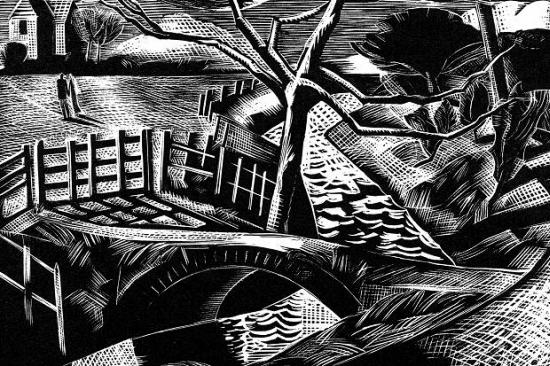
The Dyke by the Road
Paul Nash
1922
_______________________
We've all vanished into the screens of an unreal world and come back out and let the screens follow us into our world.
Guy Debord: Beyond the Society of the Spectacle
S.C. Hickman
(....)
One could say that our age is not so much the Society of the Spectacle, as it is the Society of the Immersion: we’ve become immersed in images to the point that we are images. There is no separation as in Debord. We have entered our images as appearance: it is the image, not us that is real in this world of immersion. Only signs are real, not bodies. Yet, it is our bodies that carry the signs and are still paraded before the humiliation of the Law and State.
...(more)
_______________________
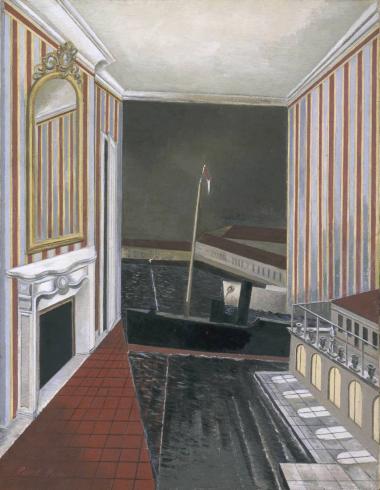
Harbour and Room
1932
Paul Nash
d. July 11, 1946
_______________________
Three Poems
Gillian Conoley
electronic poetry review
Fatherless Afternoon
Fatherless afternoon, very untitled death,
partial the anatomically endowed
tree burl that gathered many before it
along the hike the country road glorifies the human gait
the human gait developed over berries
harsh and crude
then perfected in the lunar shafts I sleep for—
I was in the life class
wanting to copy copy copy it as becries the scrivenor,
the inability
of white birch
grazing the picket fence,
yellow smearing blue across the pallet, white spackled
into sky over river
over upside down chair bobbing up
from the river
it is all waking up only to feel like a freak.
Do not simplify
any whole paradisical tale,
river held and rolled
against the small divisions,
most minute cloud displacements
please extend sunfallen hours.
Thousand words
don't eat this.
Gillian Conoley at the Poetry Foundation
Three Poems
Gillian Conoley jacket 16
_______________________
What’s the Point of Handwriting?
Navneet Alang
Maybe handwriting is neither a lost art nor an anachronism; perhaps new technology will show there is some useful alchemy left in the way language, the body, and our sense of identity intertwine.
hazlitt
(....)Digital offered a reprieve from the skittering, dissociative strangeness of my pen. The neat structure of a typed essay was like writing myself out as I wanted to be-organized, firm, forceful-becoming on the digital page who I could not be in script.
(....)
To write by hand in the 21st century is to not just find a style in script, but in movement, too-to rediscover how we map out kinetically with our hands the pulse and feeling of language. It is, in that classically McLuhan-esque way, to extend the self through the use of tools-but to feel it in an intimately physical way, too.
...(more)
_______________________
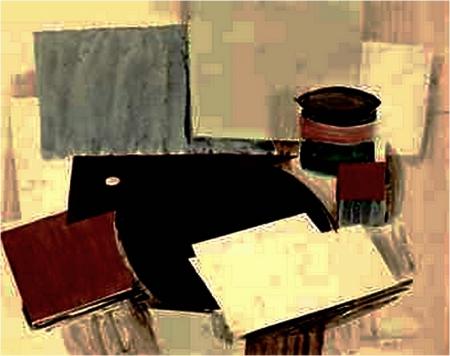
Roger de La Fresnaye
_______________________
Toward a Postmodern Theory of Value–The Rehabilitation of Jean Baudrillard
Utopia or: Bust
(....)
If Baudrillard is rehabilitated in this way, then he has given us a new theory of value, and a new theory of signification—both which resemble the Saussurean system of signs in reverse. It is almost anti-representational in nature. The theory of simulation holds that the ordering of the basic elements of signs, usually considered in terms of signified preceding the signifier, is now, in the postmodern society, reversed, such that the signifier, the image, the symbol, icon, and index, precedes the signified, the real basis of the sign. We live in a world where any concept of the real has been eroded. This, however, is not as problematic as it seems. This formulation of postmodernism, under a “strong” reading of Baudrillard, would still not entail the disintegration of the Saussurean concept of the sign. But without an intersubjective theory of value, we live in a world completely divorced from the real and containing only infinitely recursive simulacra.
...(more)
_______________________
The Right to Be Forgotten
Gillian Conoley
Sun in, out, flirtatious, in tandem
with whatever Empire wants
with each brain’s files,
the women in trenches stroll, the men in tailored trousers power up.
Philanthropists’ thirty-odd gasses in the guts
to light the towers. Mail lessens to soil,
phones fall out and melt a bit on their corners—
My charger, old age comes into the room to see the mice
masticating the underworld’s
slang, core and pith. Sunken house, black silk, suck and sob.
I figured if I ever wanted to wear a petticoat again,
I’d better do it now.
...(more)
_______________________
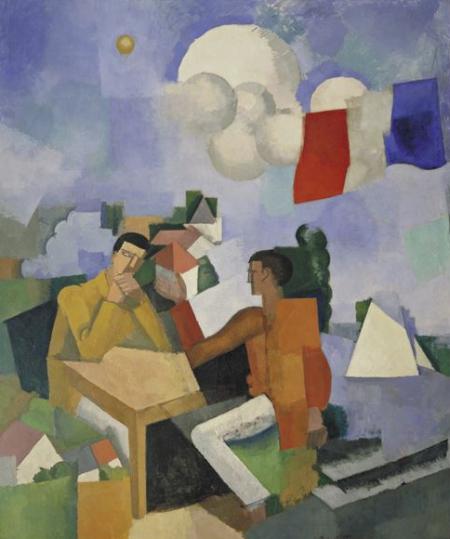
The Conquest of the Air
1913
Roger de La Fresnaye
1885 - 1925
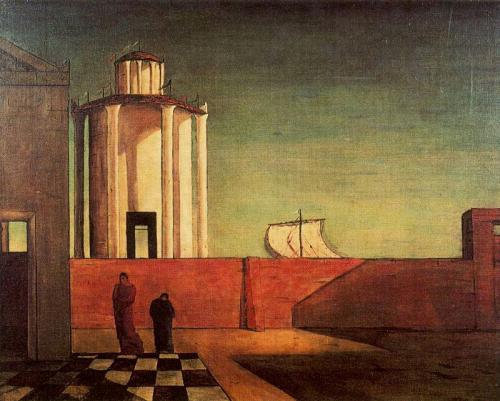
The Enigma of the Arrival and the Afternoon
1911-1912
Giorgio de Chirico
b/ July 10, 1888
_______________________
Ash Manor
James Tate
December 8, 1943 - July 8, 2015
The ghost said nothing that added to our knowledge
of the current situation at Ash Manor, only, as he parted,
“Your flesh would make delicious veal chops
for hungry wolves.” Then he called us his “disciples.”
Like the slow emigration of the mad, in the half-silence,
I blew upon the lock of the door and it opened.
I blew upon the candle, which lit itself. It was not
a dream—it was a puzzle. In my mouth there was a bowl
of beef stew, but I could not eat it. I felt hungry,
but it was not really hunger, only a feeling of hunger.
Though, fortunately, observations on bees living in the tropics
have thrown a little light on the question: as if I had
bitten my throat with my own teeth. Nevertheless the waves
of the primeval Ocean of Tantalassa were swashing over
pet seals, Tex and Tulip. A Cult was immediately formed
whose solemn purpose it was to design new uniforms for the servants.
Here was a sad emotion, belonging exclusively to the sphere
of civilized man. Photographs were taken of a trumpet
in the air; a rebuke, it nested there long after sunset,
in darkness. My eyes moistened, my great burning eyes.
The dwarfs on my side were like myself, only much shorter
and black. The dwarfs on the other side were real dwarfs,
who were really six feet tall like myself, or even eight feet tall,
but they looked as if they were no bigger than a child.
I have a little dog and they want to take him away from me.
Machines are being installed in my head.
_______________________
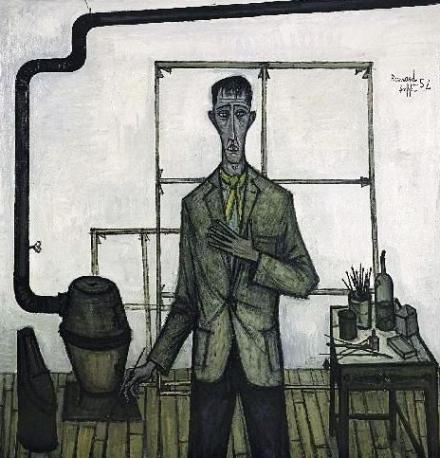
Self portrait
1952
Bernard Buffet
b. July 10, 1928
_______________________
`Little Autumnal Moments of Vision'
Patrick Kurp
anecdotal evidence
We find this in Anthony Powell’s A Writer’s Notebook (William Heinemann, 2001): “One of the most difficult things to realize when one is young is that all the awful odds and ends taking place round one are, in fact, the process of living.”
It takes a novelist to notice this truth, as novels consist largely of “the awful [and not-quite-awful] odds and ends taking place round one.” Our imaginations when young tend toward naiveté and vulgarity. They deal in cartoonish fancies, heightened states, the melodramatic. Nuance is generally reserved for the mature (of any age). Life for the young (of any age) is deferred by living, and every day is preamble to John Marcher’s “arid end.” Elsewhere in his Notebook, Powell writes: “People are boring, but not life.” And this, on the literary side of things: “A novel is simply one means of giving information.” ...(more)
_______________________

Once Removed:
The persistence of invented memory
Being a study of daguerreotypes, time, oblivion, and the poetics of beauty in the annihilated image
Shaun Caton
(....)
Without the pecuniary framework or cultural incentive to collect irretrievably scratched daguerreotypes the reader may find cause for considerable consternation at this seemingly bizarre enterprise. From infancy we are brainwashed to appraise an occidental notion of art and pictorial representation as either, beautiful or ugly - or more fundamentally, good and bad. In applying this banal and limiting process of appraisal to daguerreotypes we are able to make ' selective ' choices based upon an enforced and blinkered education on the condition of things. Thus, imperfection is generally regarded as unrewarding and is not acknowledged as worthy of investment unless the item in question happens to be something very ' exceptional ' such as a whole plate outdoor scene. Then, it would seem, that despite thumbprints (operator's signatures?), wipes, and scattered tarnish the image is still desirable, simply because it is big and shows an exterior landscape. Enter here the concept of rarity to embolden and ballast this hypothesis and we have what is proverbially called in the trade as a ' winner '. There is surely some irony here?
(....)
So, how can one entice interest in an image that has literally given up the ghost? Can such a possibility for relating to these impaired pictures be offered as an alternative visual aesthetic to that which was originally sublime? In an abstract sense can the beholder of the ancient mirror photograph inhabit its blackened and pock marked surface with any nostalgic sense of symbiosis or synasthesia? Such a premise may appear monstrously fantastic to a body conscious society which is principally obsessed with improving outward appearance through the employment of cosmetic surgery, radical dieting programmes and a spurious addiction to the booming therapy industry. Can we attribute such obtuse and superficial value systems to inanimate objects that completely exist as mementoes outside of our own somewhat fractured time frame?
...(more)
_______________________
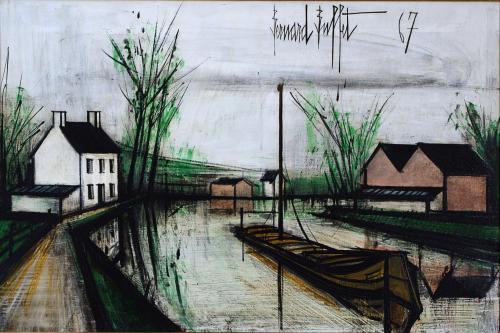
Bernard Buffet
_______________________
The Wrong Way Home
James Tate
All night a door floated down the river.
It tried to remember little incidents of pleasure
from its former life, like the time the lovers
leaned against it kissing for hours
and whispering those famous words.
Later, there were harsh words and a shoe
was thrown and the door was slammed.
Comings and goings by the thousands,
the early mornings and late nights, years, years.
O they've got big plans, they'll make a bundle.
The door was an island that swayed in its sleep.
The moon turned the doorknob just slightly,
burned its fingers and ran,
and still the door said nothing and slept.
At least that's what they like to say,
the little fishes and so on.
Far away, a bell rang, and then a shot was fired.
_______________________
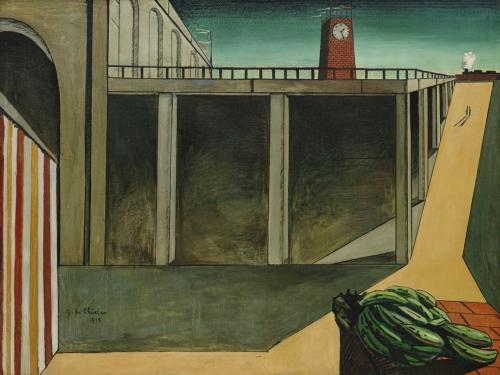
The Melancholy of Departure
Giorgio de Chirico
1914
_______________________
Cognitive Capitalism [pdf]
Yann Moulier Boutang
Translated by Ed Emery
(....)
This regime manifests itself empirically through the important place of research, of technological advancement, of education (the qualiry of the population), of information flow, of communication systems, of innovation, of organisational learning and of management organisational strategies. On the demand side, consumption is also oriented towards technology, and particularly technologies of the mind - in other words those that set mental faculties into operation through interaction with the new technical objects: audiovisual media, computers, the Intemet, game consoles.
It follows that human capital and the quality of the population have now become crucíal factors in defining the new wealth of nations. The material basis of the new information rechnologies (which are grounded especially in new telecommunications infrastructures) makes possible a dematerialisation of cooperation (in which distance is abolished) and a questioning of the kind of hierarchies inherited from the monastery (twelfth century), from the plantation (seventeenth-eighteenth centuries), from manufacturing (eighteenth century), from the large factory (nineteenth century) and finally from the giant firm (1880-1980). (....) _______________________
The Social Construction of Race
Brian Jones
(....)
For the first time in human history, the color of one’s skin had a political significance. It never had a political significance before. Now there was a reason to assign a political significance to dark skin — it’s an ingenious way to brand someone as a slave. It’s a brand that they can never wash off, that they can never erase, that they can never run away from. There’s no way out. That’s the ingeniousness of using skin color as a mark of degradation, as a mark of slavery.
But it’s not until you have systematic African slavery, until the cost of an African slave dips below the cost of an indentured servant, that you get the rush of African kidnappings and the development of mass African enslavement and the ideas to justify it.
(....)
This talk has focused on people of African descent in the United States. But once it became the dominant idea in the US, racism proved to be a highly useful ideology. Racism allows you to carve up the entire world into so-called races.
And then it becomes available as an ideological framework to explain and justify wars, and to explain and justify the subjugation of all kinds of people — so-called immigrants from Mexico, for example — or to describe what the United States continues to do to its native population. And all of those racisms have particular features, dynamics, and politics that are unique to those struggles and to those contexts. It’s a highly malleable set of ideas.
...(more)
_______________________
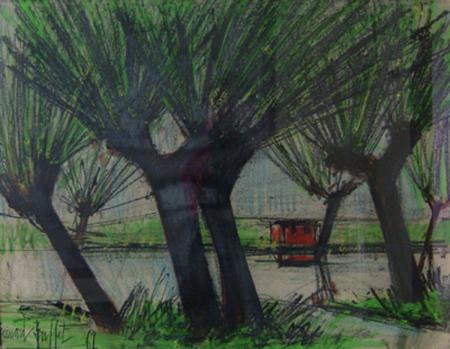
Bernard Buffet
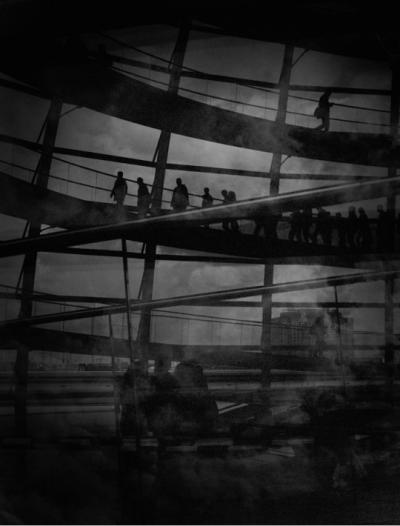
Jason Langer
_______________________
America 1960, California 1961, Mexico 1982
Lawrence Ferlinghetti
Big Sur Journal
September 1961
(....)
September 16
… stars out tonight, enormous, myriad traceries! Webs! Sad mute histories! Wheeling by. All these suns gone down already, at midnight, the universe itself not there anymore, nothing up there, out there anymore, all burned up millions of light-years ago, nothing left but the light of it now reaching me, in sleeping bag, staring up—at Nothing. I like small constellations best, like the Pleiades and Delphinus—they wheel by, hours apart but in the same plane, both passing thru the same frame of the open overhang of my lean-to. And I dream I am making a book cover for a book of the story of my life, and dream the square open frame of stars as the cover, first with Delphinus in it, then the Pleiades, then a still more distant, and colder, smaller stiller constellation I don’t recognize. But, bang, now comes great Orion over the dark trees, waving his great spangled belt—Flashing lightbulbs in it!
I see dark things rushing across the country.
...(more)
California and the Imagination (VQR, Summer 2015)
_______________________
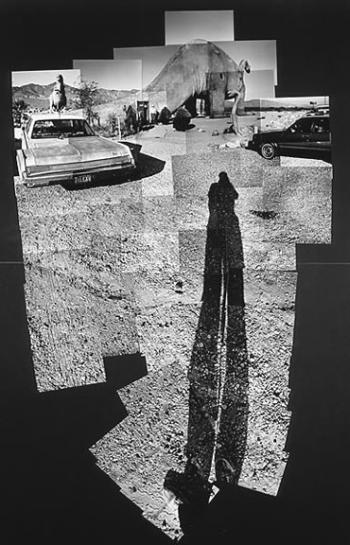
Prehistoric Museum Near Palm Springs
photographic collage
David Hockney
_______________________
On Pynchon’s California Novels
Sean Carswell reviews Pynchon’s California, Scott McClintock and John Miller (eds)
berfrois
(....)
... When one considers how appropriate California is for Pynchon and Pynchon is for California, a collection of essays focusing on the intersections of the two becomes necessary.
McClintock and Miller do an admirable job of addressing this need in Pynchon’s California. The nine essays in this collection focus mostly on the California novels— Inherent Vice, Vineland, and The Crying of Lot 49 —and they take a variety of approaches to address these novels. Essays explore issues of detective and noir novels, land use, private property, marijuana, religion, spirituality, ecology, power, resistance, and freeways from a variety of theoretical approaches. The contributors constitute a nice balance between usual suspects in Pynchon studies and new voices. Like all essay collections, some of the works are stronger than others, but unlike many collections, all of the contributions to Pynchon’s California are high quality and worthy of consideration.
Perhaps the standout of the collection is Hanjo Berressem’s “Life on the Beach: The Natural Elements in Thomas Pynchon’s California Trilogy.” Berressem blends an ecocritical approach relying heavily on Mike Davis’s Ecology of Fear with Gilles Deleuze’s concept of assemblages (aggregates of smaller, interrelated thoughts or particles) to examine the elements (solid, liquid, gas, plasma, and aether) of Pynchon’s California novels. “The world,” Berressem writes, “consists of infinitely complex material and immaterial assemblages. From within different modes of thought, such as science, art, and philosophy, humans construct patterns from this given complexity”. Berressem constructs his own patterns out of the complexity of Pynchon’s novels by meditating on the aggregate of the aforementioned elements, on the philosophy of Deleuze, and on the geography of the novels.
...(more)
_______________________
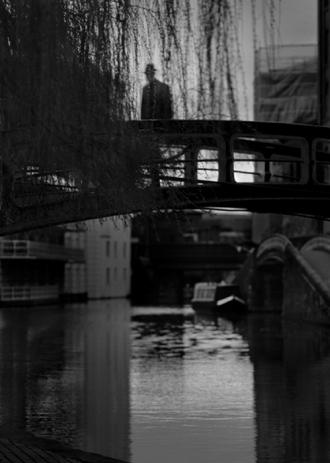
Jason Langer
_______________________
Twenty-first Century Russian Poetry
Edited by Larissa Shmailo
big bridge
Ilya Krieger
Translated by Alex Cigale
In forests, in deep blue forests,
In the house, assembled out of pine trunks,
In the house, assembled out of forest shadows,
In the house, assembled out of the night's silence,
In the house darkening and dozing,
Where whispers remain, where whispers stroll on the ceiling,
Where there are clipped wings, where there is honey and milk,
Where there are hushed sobs, where ivy covers the ceiling beams,
Where time stands still, where motion is outside only, not here,
In the house made of rain and fog,
In the house that stands over trampled stars,
In the house, assembled out of trunks of pines,
In the house, assembled from the forest's gloaming,
In the house, assembled from night's silence,
In the house, assembled out of viscous dreams,
In the house, where a part of me has securely settled,
For that house - is the end-all and be-all,
He who spends a night in the house, which I, fortuitously, vacated,
He will not continue on his path unaltered,
He will die and be reborn, his friends will not recognize him,
A part of him will remain there, within the walls of the house,
In the forests, in deep blue forests,
In the house, assembled from trunks of pines,
In the house, assembled out of the forest's dimness,
In the house, assembled out of the night's silence.
...(more)
_______________________
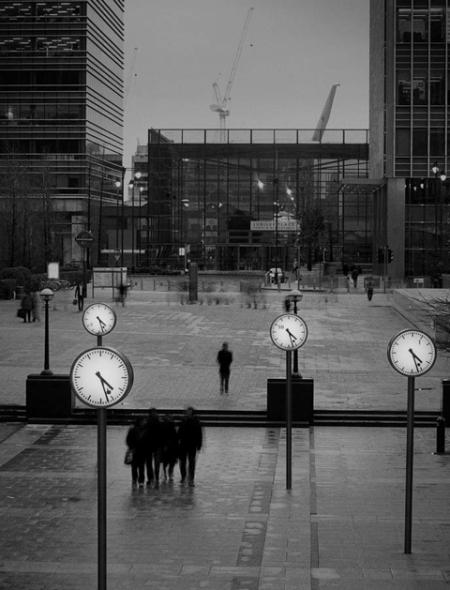
Canary Wharf
Jason Langer
_______________________
Franz Kafka’s ‘The Problem of Our Laws’
translated by Michael Hofmann
London Review Of Books
We live on the razor’s edge. An author once put it this way: the only visible unquestionable law that has been imposed on us is the nobility, and who are we to rob ourselves of the only law we have?
_______________________
The history of public debt is full of irony. It rarely follows our ideas of order and justice.
Thomas Pikettytranslation presented by Pierre Joris
... Look at the history of national debt: Great Britain, Germany, and France were all once in the situation of today’s Greece, and in fact had been far more indebted. The first lesson that we can take from the history of government debt is that we are not facing a brand new problem. There have been many ways to repay debts, and not just one, which is what Berlin and Paris would have the Greeks believe.
ZEIT: But shouldn’t they repay their debts?
Piketty: My book recounts the history of income and wealth, including that of nations. What struck me while I was writing is that Germany is really the single best example of a country that, throughout its history, has never repaid its external debt. Neither after the First nor the Second World War. However, it has frequently made other nations pay up, such as after the Franco-Prussian War of 1870, when it demanded massive reparations from France and indeed received them. The French state suffered for decades under this debt. The history of public debt is full of irony. It rarely follows our ideas of order and justice.
...(more)
_______________________
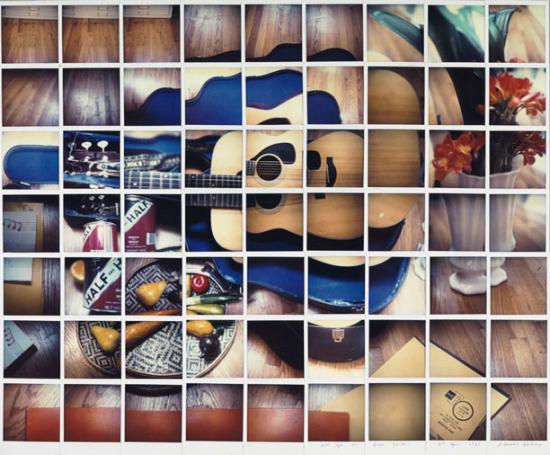
Still Life Blue Guitar
composite polaroid
David Hockney
b. July 9, 1937

Tierras silúricas / Las perdices
1931
Benjamín Palencia
b. July 7, 1894
_______________________
You Water, You Gooseflesh
Aris Fioretos
Translation: Tomas Tranæus
Liquidity
It is said that you emerged at the heart of Europe, that you are an invention of the old continent in the same way as democracy or the smallpox vaccine, or for that matter the thumbscrew and biometrics, that your origins are the medieval romance but that you, since newspapers began serialising you, have appeared in most conceivable guises, from family sagas replete with sabre-rattling and samovars to recluses who stuff their mouth full of stones by some godforsaken shore, though personally I dream of you as water, limitless yet ductile and containable, just as often dirty spume as aphrodisiacal slop, because I believe you can assume most forms without being lost, which is to say that you contain multitudes, like water in water, and therefore I beseech you who are many, as if the centre were everywhere and thus there were something to make you remain yourself despite shifting currents, and I wonder if this sustained unsettledness, which might also be termed liquidity, should not be seen as your greatest asset; perhaps it is the only reason still to believe in you as a form of knowledge in its own right, that is, to assume that you have a future in an era of media redundancy, so allow me to clear my throat and suggest ten, er, commandments for the future, written as should be on water, of which the second after your liquidity would be
...(more)
.....................................................
Aris Fioretos interview
(....)
KJ: It must take you a long time to write a book, if, all the time, you have to re-write it, re-read it, then re-write it again.
AF: Regrettably, I’m not able to shake aces out of my sleeve every so often, on command. I put together sentences the way birds pick grain on the ground. At times, I suppose this disposition has led to moments of, well, anguish. But rewriting is integral to any writer’s work. And it’s not about complication, really. Ideally, you begin simply, or simple-mindedly, writing whatever corresponds to what preoccupies your thoughts. Inadequate is only the first name for the text thus produced. Full of contorted characters and tormented twists of phrase, it has little to do with that to which the alphabet ought to be used. After a while, however, the text gathers momentum. Or at least a certain complexity. You may lose the thread; you may never regain it; you may be sidetracked and end up in an impasse neither calculated nor cherished. But if you’re lucky, you manage to work your way through this maze to whatever serves as your text’s end. Then you’ll discover another kind of straightforwardness, a sort of second-degree simplicity, which, for those who are careless, may seem almost like what you started out with, but never is.
For me, it would be lethal to throw up the hands and say, well then, why not be content with what you began with? Surely there is no need to complicate things, no need to exert yourself, if the result is so bewilderingly close in appearance to what you started out from? The difference, or saving grace, is that the “second” simplicity is soaked in complexity. Oddly, the text will ring hollow if you avoid this process.
Nor should one underestimate the importance of the time spent being inactive. I think it was Flaubert who once termed “the marinade” those countless hours that you while away spread out on your couch, seemingly impassive and dejected, not doing much of anything, certainly nothing of social use. And yet, afterwards, when you’ve finished your text, you realize those protracted moments were not only vital but essential to where you were going.
...(more)
via Flowerville
_______________________
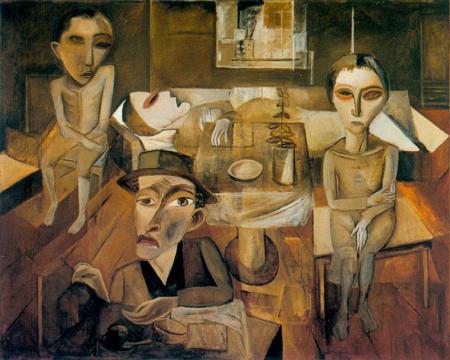
A Família Enferma
(The Sick Family)
Lasar Segall
1891 - 1957
_______________________
No longer do I organize time chronologically. Keeping time reminds me of where I went wrong.
The War of ForgettingInspired by Eduardo Galeano, the discovery that all wars-personal, territorial, political-have afterlives in our grief and memory.
Michelle García guernica
(....)
... The desert as a refuge for the forgotten seemed to offer the possibility of slipping outside of time. And time had turned against me, becoming a lifeline for grief and guilt, distorting my sense of the past by thrusting all thoughts back to the source of the grief, the instant of regret.
Neat divisions of time are largely obliterated in the war of forgetting. The past and present co-mingle, speak to, and inform each other. Anyone who has ever lived through war, with its echoes of regret, knows that a war of forgetting endures after the bodies are buried, the peace accords are signed, and the soldiers remove their uniforms. The war of forgetting is the undocumented legacy of war, often relegated to the psycho-analytic bins of trauma, nostalgia, and remorse. For the next seven years, the war of forgetting would dominate my travels and my attention, but after each experience, I hesitated to write about what I had seen until I could give shape and words to the absence, the missing.
...(more)
_______________________
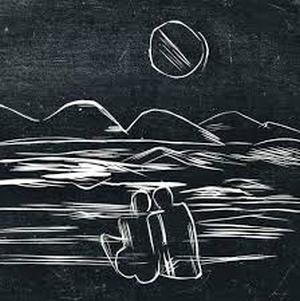
Lasar Segall
_______________________
So what happened between 1948 and 1955 to turn an able scholar and mildly interesting poet into the author of one of the liveliest poem sequences in the modern era?
All the girls said so
August Kleinzahler on John Berryman
(....)
For what then seemed a lengthy spell, from the late 1950s well into the 1970s, the standard-bearers of American poetry were a group of manic depressive exhibitionists working largely, if not exclusively, in traditional metre and rhyme schemes, analysands all, and with self-inflating personae that always reminded me of those giant balloons of Mickey Mouse and Pluto associated with Macy’s Thanksgiving Day parade. They published and reviewed one another in journals like the Nation, Partisan Review, the Kenyon Review and Sewanee Review, with a good deal of auto-canonising. Robert Lowell, almost by default it seemed, was ceded pride of place, the ‘most important American poet now at work’. Lowell and Randall Jarrell, roommates at Kenyon College in the 1930s, and to a lesser extent Berryman too, were big on rating and ranking: the top three poets, the top three oyster houses or second-basemen, the three best Ibsen plays – they seemed especially to like the number three.
How do they rate now? It all looks a bit different fifty years on – it always does – after all the theatrics and hyperventilating, the crack-ups, ECT, Pulitzers, heart attacks, suicides, obituaries, followed hard on by biographies, critical appraisals and reappraisals, canonisation and decanonisation. This is the group sometimes known as ‘confessional’ poets or ‘mid-century’ poets: ...
...(more)
_______________________
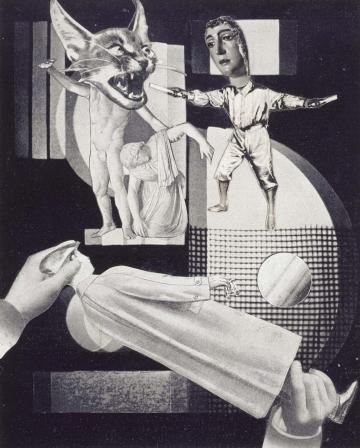
Photomontage
Benjamín Palencia
1935
_______________________
from Interstices
Rachel Blau DuPlessis
Heir Apparent
Ledger 1:
So
I dismantled it.
Mounted it and then dismantled it
but its uncanniness,
its Nessie in Loch Ness-ness
lurks and snuffles and sways.
So—once again.
Wrapped and unwrapped,
floated and dried—
unruly it. I took it up
(I took it on), and twisted it
to find—to make—
its seams and splits.
Rapt and ripped.
Made and mined,
brooded and unbound.
The grains of sand,
uncountable mysteries
of former shells,
the layers of misty color
over the nose of the moon—
I tried to honor these
endless metamorphoses.
The poem being stoppage
in a flow of dynamism—
Does one want to take
that way as path?
Blockage? fixity?
...(more)
Heir Apparent
Rachel Blau DuPlessis at EPC and the Poetry Foundation

the Quarry
1917
André Lhote
b. July 5, 1885
_______________________
What matters isn't what I could feel ...
Chus Pato
From: Hordes of Writing
translated by Chus Pato and Erín Moure
What matters isn’t what I could feel, but the real existence of the house and that dreams resided there; most are chapters, sections of novels: some hard-to-solve murder, shots fired by the vice-consul in Lahore, Lowry’s volcanoes… unfold like atmospheric phenomena, all-encompassing, and despite belonging to literature they emit no sound but luminous epiphanies of pure pigmentation like the installations of Anish Kapoor
when I arrived I hoped to find my sister and brother comrades. No, the house isn’t abandoned, between us everything was a cyclone of blood and totem
there are other perspectives, of course
*
(....)
when we dream, the stopovers in trembling and abrupt transformation are always spring and winter. Persephone dissects Hades
to evoke the garden, luminosity in the plenitude of winter / not only Eurydice but the genitals tauten, the couple encircled by the species, brutally outside the logos
every night, when language shuts its eyes, it descends to the depths. There, by a placid river, in a forest, the body of Orpheus is dismembered by ecstasy
the screen on which we project ourselves is as blurry as the waters; inside the drum, animals live, ancestors that mate and dream of spring and every night the voice we learn fascinated from the mother is shattered by drunken copulation
it’s Eurydice and Orpheus who point out North, polarization, stars. They disperse the social, the mother tongue, cavort in a garden, copulate
*
yesterday, an algae green and thick in the current was cobra, drakar, a curl of animality, Medusa, Orpheus, Eurydice
...(more)
Chus Pato at Poetry International
Translation and Its Affective Challenges:
Bodies, Spacings and Locales from the Okanagan to the Deza, from Canada to Galicia
Erín Moure
(....)
How does a reader in Culture1 (America) receive a book from Culture2 (Galicia), translated by someone living in Culture3 (Canada) who has been steeped for fifteen years, yes, in Culture2, but still cannot avoid viewing it from Culture3? It’s a change of body, a body-altering machine, and anything that involves the body, thought, difference, involves affect.
Chus Pato writes, in her Secession, of writing, dismemory, the voice. If the poem is an animal voice, something voiced through the animal in us, affect might be located in the immaterial tissue composed of its reception and of its sounding. It can’t be otherwise, if we are (and we each are) embodied in these variegated but similar pouches of human cells.
If, as I say in Insecession, “translation is a way of bringing—into the secession or cut—another voice, her human voice, its markings in words from a culture across a far border, so as to mark these words into new ears and onto new bodies, under new skin, over those mountains,” then translation must find ways of laying bare the risks in altering the space/time continuum of a text: how can I write Chus’s text from the Galician of a rainy mountainous and very green landscape of mists into the English in Canada of the dry land of the Okanagan, where green means the presence not of rain but of irrigation?
Yet I can and do stand in the desert lands of the Ukwnaqín or Okanagan peoples and say in English: the poetry of Chus Pato.
As such the immaterial membrane of both sound and of hearing, its trous and buracos, the holes in its fabric, are laid bare and visible in the text not of each of us (our blind spots protect us) but in the third text that emerges when my text is lain beside Pato’s: this new text is immaterial but affect-ridden: it emerges where there is a permission that allows a traverse of human energy, regardless of the risk, and permits the violation, as Chus Pato writes, of “the state of permanent emergency that oppresses us.”
...(more)
Evening Will Come: A Monthly Journal Of Poetics (Affect Feature—issue 55, July 2015)
_______________________

Cup of cognition
(The Children's Cup)
1894
Odilon Redon
d. July 6, 1916
_______________________
"[D]iscursivist … social and political theory could not explain how things like turnstiles in subways, mountain ranges, and ocean currents also organize social relations and perpetuate forms of domination because they had already decided that things are only vehicles or carriers of social signification and relations. Because things had been erased, it became nearly impossible to investigate the efficacy of things in contributing to the form social relations take. An entire domain of power became invisible, and as a result we lost all sorts of opportunities for strategic intervention in producing emancipatory change."
- Levi Bryant, Onto-Cartography
Corporeal and Incorporeal Machines
Ian Lowrie on Onto-Cartography : An Ontology of Machines and Media
(....)
It should be noted that the “old” materialism and contemporary social constructivism, when viewed in this light, should not be seen as antagonistic to one another. Instead, they can be seen as two sides of a Mobius strip. Both understand the stuff that the universe is made of as essentially inert, or nonproductive; as either mutely going about the business of mechanistic unfolding, or as only inchoate grist for the mill of human thought. And for these reasons, say the New Materialists, both old materialism and social constructivism have got to go.
Against this tradition, the New Materialist project aims to revive a subterranean lineage of materialists aware of the “vibrant,” “creative,” “self-organizing” powers immanent within matter. In the work of Spinoza, Diderot, Bergson, Darwin, and Nietzsche, the young Turks of New Materialism find the ground for their rejection of all forms of both mechanism and dualism.
(....) Levi Bryant’s latest book, Onto-Cartography, is a particularly valuable contribution to this growing field of inquiry. It directly addresses many of the objections that might already be creeping into the skeptical reader’s mind: if everything is just “stuff,” how does one explain the power of immaterial forces like ideology or culture to shape human activity? In what sense can we really say that a spoon, to pick an example, is “lively” and “creative”? In what way is an artifact like that spoon the same as an organism like my golden retriever? How can we sensibly talk about both human thought and the merely physical world at the same time? Rather than relying (primarily) on philosophical arguments against either constructivism or mechanism, Onto-Cartography attempts to introduce a substantive explanation for the powers held by things and a sophisticated analysis of how things actually function and interact with one another.
In so doing, Onto-Cartography also hopes to articulate a new form of politics — or at least to provide fertile ground for future political thought. ...(more)
_______________________
Blueshift Series
ctheory books
Life is a breath away from ice-jammed fate and concrete edges, black and white dreams and shredded consequences.
Like the high velocity approach of a massive object from the spectrum of digital space and time that surrounds us, technology has suddenly blueshifted, moving closer and closer to the epicenter of the contemporary human condition. A digital wave that is energized by its increasingly short iterations, signaled by its disruptions and perturbations, and tangibly felt by its aura of cold to the color blue. Already visible in the cerulean sky of data are new constellations of the future, waiting to be interpreted for their political implications and social entanglements by writers and artists involved in the BLUESHIFT SERIES.
Surveillance Never Sleeps [pdf]
Arthur and Marilouise Kroker

_______________________
Shadow and substance
Hannah Arendt knew how to be a pariah. Is that the key to being a 21st-century cosmopolitan?
James McAuley
aeon
(....)
Arendt survived, and she was among the millions of deracinated Europeans forced to remake themselves on foreign shores, in foreign languages. As she wrote in her poignant essay 'We Refugees' (1943): 'A nice little fairy tale has been invented to describe our behaviour; a forlorn émigré dachshund, in his grief, begins to speak: "Once, when I was a St Bernard…"'
(....)
... there is more to Arendt's unsettled legacy than glamour, controversy and a provocative set of historical and philosophical interpretations. Forty years after her death, perhaps the most enduring contribution of this decidedly 20th-century thinker is her thinking about a cosmopolitanism suited to the challenges of the 21st century she'd never see.
...(more)
_______________________
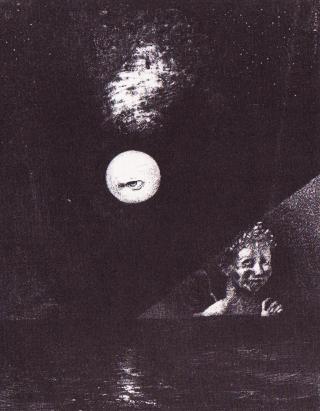
On the Horizon, the Angel of Certitude
and in the Dark Sky, A Questioning Glance
Odilon Redon
1882
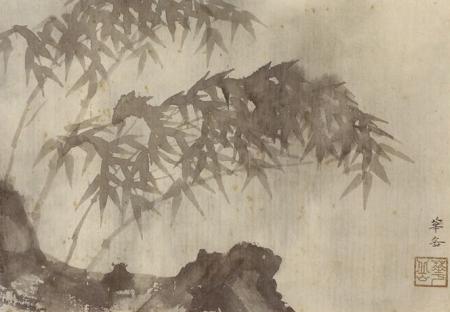
Bamboo in the rain
Kagaku Murakami
b.: July 3, 1888
_______________________
Scar Letters
Theodore Worozbyt
Beard of Bees Publications (March, 2007)
Salamander
If not for the rock the salamander wouldn’t twitch in the rain. The red twin doors stuck on one side, the one nobody used. An insect has left me with months of agues, a lump of greenish brown under my hip skin. The liquid on the keys is sticky. I knew ghosts who smell like turtles and put the erasure of the sun in a shoebox. If you walk before dawn in the grass by the river you will die. Make no mistake. The grackles knew. I grew corn, Silver Queen, sweet on the tongue as bees. My tulips bloomed in the shade. Incarnadine and saffron are their names. I breathe in deep the smells of feculent chemicals because I am clean in my yellow windbreaker, terrified of stings. If I had been in love just once more I might have made it through the membrane separating microscopic gauze from immensities. The pinhole was supposed to make an image on the other side, on the foil. It was the only safe way to look without burning out your eyes. The rock gave a sucking sound when I pulled it from the leafy dirt. The salamander wriggled like a starry midnight sky with feet and eyes in my palm. When I put the salamander back, the rock fit wrong. White and flat, the pebble roof contained my mother. The day was cloudy, the total eclipse invisible. Underneath the row of skylight windows she moves around in the kitchen and the black and white tv is on. She is watching Andy Griffith as she cleans. His wife has always been dead and he doesn’t wear a gun. In my hand, in the rain, it stopped moving when I turned it over and pressed my finger to its bleached belly, as if touching by then meant anything but how it would be remembered.
Theodore Worozbyt at the Poetry Foundation
_______________________
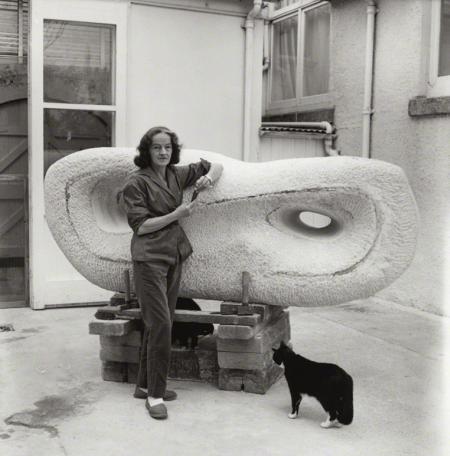
Barbara Hepworth
1903 - 1975
Photo by Ida Kar,1961
Looking at the world through the eyes of Barbara Hepworth
Barbara Hepworth’s work and its universe of meaning.
Ali Smith
(....)
“Your work is very organic,” an interviewer says to her in the 1970s. “It’s meant to be,” she replies. “I’m organic myself.” The book (Barbara Hepworth: Writings and Conversations (Tate Publishing) is full of small, brilliant revelations, such as her interest when she visited Brancusi’s studio in 1933 in how he used “great millstones” as the bases for his classical forms – maybe a source of her own penchant for breeze blocks? On a larger scale the collection prompts a rethink of any clichés to which we might have settled, over the years, about Hepworth and her work. “I think of landscape in a far broader sense,” says the artist it’s easy wholly to associate with the real landscapes of Yorkshire or St Ives; “I extend its meaning to include the whole universe.”
Art for her was a language with real consequence – “the only language”, she said in 1952, “which nations can speak together and they don’t quarrel. And yet in times of stress and war, the tiny grant which the state provides to maintain the visual arts is the first to go.” The book makes clear her deep political involvement. Hepworth, the opener-up of deep recesses in closed forms, writes to the Times in 1956 about the Hydrogen Bomb, “a subject which must occupy the deepest recesses of all our minds”. It is she who drafts the statement sent to the Sunday Times signed by 59 artists in 1961: “there can be no true culture while we make stock-piles of nuclear weapons”. She makes a handy “list of my convictions” to give to a visiting Daily Express journalist in 1961: pacifist, UN and nuclear disarmament supporter, anti capital punishment, a Labour Party member after Suez, an anti-pollution activist . . . “I’m surprised at myself,” says another interviewer, this time from the Yorkshire Post, arriving in St Ives in 1962 to lambaste her for defaulting to the southern warmth and, he imagines, a cliquey artists’ community. She talks to him seriously, shows him some works. He apologises, a bit amazed. “I’m usually quite a reactionary, you know.” And to Robert Hughes in 1966: “We had a silent spring here last year,” she says; “have you read Rachel Carson’s book?”
...(more)
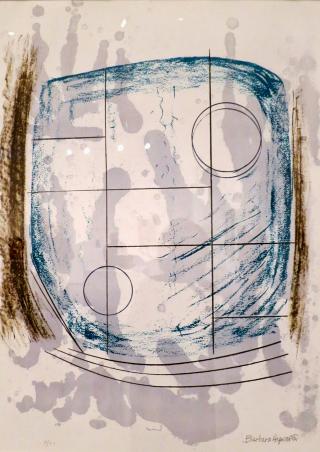
Cool Moon
from Aegean Suite
Barbara Hepworth
_______________________
Putting Poetry In Its Place
Simon Armitage
The Hillary Lecture, Oxford - 2 March 2015
(....)
On the few occasions I’ve been to lectures on poetry given by poets, it turns out that the best kind of poetry, and indeed the right kind of poetry, is coincidentally very similar to that of the lecturer’s. And something of that kind will no doubt happen today. But I hope not to use this hour to lay down the law about what poetry is or what it isn’t. And I should apologise in case the title ‘Putting Poetry in its Place’ has attracted people under false pretences, brought curious citizens cycling over the cobblestones hoping I might belittle my chosen art or give it a bit of a dressing down in public. All I want to do, in fact, is to celebrate the role of setting and situation in poetry, and to gently worry if part of poetry’s inheritance is being gradually forfeited in favour of more ethereal tendencies and styles. Its environmental birthright squandered for a mess of lentil stew.
Most poets I know teach, and most of them teach poetry, and the focus of much of their work is not the poetry of Dickinson or Shelley or Chaucer but the poetry of their own students. Poets teaching poetry has become something of a given over the past three or four decades, to the point where the term ‘poet’ is as much a university pay-grade as it is a description of a person’s literary accomplishments, particularly in the United States. Whether this relationship between creative writers and Creative Writing is a good or bad thing is open to question. To some it’s a necessary way of providing esteemed practitioners with financial security, recognising their artistic merit within an academic setting, disseminating knowledge among dedicated novices, and spawning future protégés through a professionalised form of intellectual apprenticeship. To others it’s a shameless method of raiding the bank accounts of unrealistic students, battery-farming sterile poets, cloning anaemic poems in the poetry workshop’s fluorescent daylight, and ensuring poetry’s descent into kind of software programming language incomprehensible to all but the Masonically initiated. If it’s the latter then I’m as guilty as anyone, having presided over hundreds of poetry workshops and seminars through several lectureships, professorships and visiting professorships in this country and abroad, but the Hogwartian system of poetic education isn’t my subject here. What concerns me, fascinates me, occasionally horrifies me but now rarely surprises me, is the number of times students bring poems to class which leave fellow students baffled and bewildered, and leave the tutor in much the same state. Poems which even after the most rigorous, in-depth reading they’re ever likely to receive, by several high-functioning individuals with a declared commitment to the cause, still resist the most basic analysis. The class might marvel at the clever use of a gerund in line three, or spend 35 minutes debating the relative merits of a semi-colon over a hyphen, or the poem might lead us into a discussion about recent breakthroughs in neuroscience. But by and large it remains a mystery. Which wouldn’t be a problem if mystification or deliberate vagueness was the author’s intention, but upon interrogation it usually turns out the poet had a very clear picture of the poem in his or her mind, a sort of framed vision, outlining a very definite set of circumstances. When I ask the author to replace the title, ‘Echoes’ it might be called, or ‘Conundrum in the Key of Clouds’ as I had recently… when I ask the author to replace the title with a geographical place-name appropriate to the poem’s subject matter, or to replace an adjective with some straightforward description of the poem’s whereabouts, seven times out of ten everything becomes clear. The poem's unintended obscurities are resolved.
...(more)
Areté
_______________________
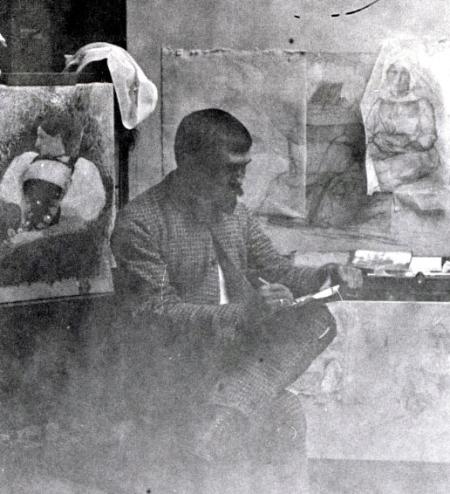 Pascal-Adolphe-Jean Dagnan-Bouveret
d. July 3, 1929
Working on Tracing Drawings for "Breton Women at a Pardon." ca. 1887
Photographer unknown
_______________________
An 18-Hour Playlist of Readings by the Beats:
open culture
These 249 tracks include not just figures like the previously alluded to Allen Ginsberg, William S. Burroughs, and Jack Kerouac, but other beloved Beats such as Gregory Corso, Peter Orlovsky — and Charles Bukowski, not a figure one necessarily associates closely with that movement. Some Bukowski and/or Beat enthusiasts will tell you that each would have nothing to do with the other. Yet the hard-living poet and self-confessed “dirty old man” occasionally admitted to something approaching fondness for certain members of the supposedly higher-minded counterculture: “He’s better to have around than not to have around,” Bukowski once said of Ginsberg. “Without his coming through, none of us would be writing as well as we are doing now, which is not well enough, but we hang on.”
_______________________
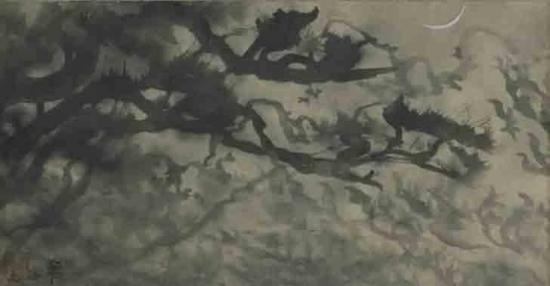
Crescent Moon over Rugged Mountains
Kagaku Murakami
1936
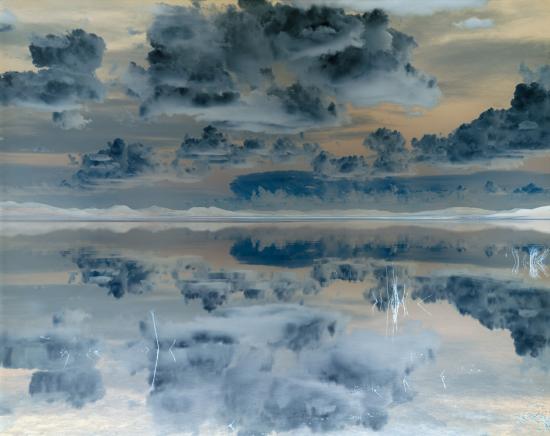
Color Reverse
Richard Misrach
_______________________
ON SUNDAY MORNINGS
Togara Muzanenhamo
walk down and enter history,
smoke white breeze over trilby
shadow, warm September air.
Corrugated roofs skirt over
iron railings, linking sunlight
store to store. Avenues run
wide as riverbeds cut straight,
ironed flat by the wind, sun
and rain. With the glare it’s
almost a dated photograph
from 1922, stiff grey streets,
the growing town dwarfed
by the thought of surrounding
land, distant hills bounding
north. Now bitumen stands
thick where dark grit sands
absorbed sunlight, shaded
gables shrinking into heat,
old colonial names – faded
but blocked out in concrete –
speak like scripts on graves,
and not one car in sight, nor
a lone hum, but rustling leaves
scuttling by to a chorus caw
of crows, the town deep in
slumber, its people locked in
dreams they hardly remember
when they wake past noon –
the dry mists of September
turning through the small town.
Togara Muzanenhamo at Poetry International
via The Page
_______________________
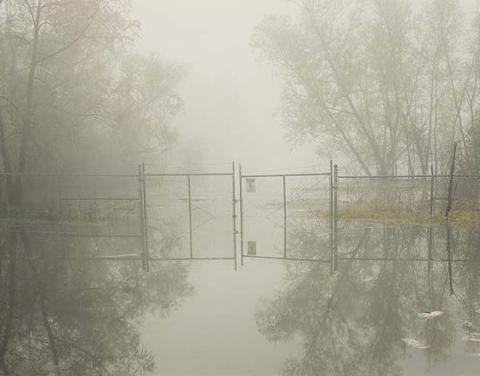
Hazardous Waste Contaiment Site
Dow Chemical Corporation
Placqueline, Louisiana, 1998
Richard Misrach
_______________________
Ecopoetic resurgence:
Feral/interdisciplinary/bioregional
Notes on ecopoetries from the Association for the Study of Literature and Environment Conference (June 23–27, 2015)
Linda Russo
jacket2
In their plenary at the recent conference of the Association for the Study of Literature and Environment, Donna Haraway and Anna Tsing oriented us toward the concept of a multi- species world-making based on the ecological process of resurgence. Resurgence, they clarified, is the response to a “disturbance” – any quick ecological change, such as farming. They explained that in our management of ecosystems, we block resurgence – even though an ecosystem (and we humans) can’t survive without it. Resurgence arises from the ability of plants and animals to move around and make their own rearrangements of and contributions to an ecosystem. Blocking resurgence results in the eruption of destructive feral biologies – they spoke of killer fungi and other forms of blight unleashed by and on nonhuman organisms. With this as a backdrop, Haraway and Tsing provoke a new, collaborative world-making with deep-seated materialities. They begin and end by reminding us that stories, in particular, help us rethink human and nonhuman resurgence.
In their model, it seems, feral biologies are solely destructive. But as I listened to several ecologically-oriented poets present their work over several days, I saw ferality engaged as positive resurgence. The feral sometimes took the form of posthumanist subjectivity, sometimes it was articulated through a rewilding of knowing through poetic interventions into otherwise "settled" discourses, sometimes it sprung up as a reworking of relations in place through an emergent bioregional consciousness. In a variety of works I saw the creation of new contexts for thinking and enacting ecological work.
...(more)
_______________________
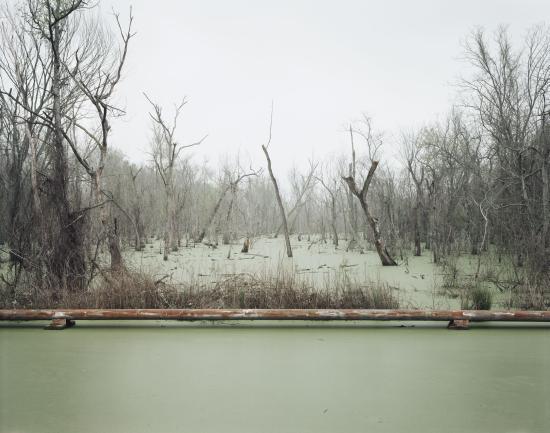
Swamp and Pipeline
Geismar, Louisiana
Richard Misrach
_______________________
Oppression
From: Marilyn Frye, The Politics of Reality
(....)
The root of the word "oppression" is the element "press." The press of the crowd; pressed into military service; to press a pair of pants; printing press; press the button. Presses are used to mold things or flatten them or reduce them in bulk, sometimes to reduce them by squeezing out the gases or liquids in them. Something pressed is something caught between or among forces and barriers which are so related to each other that jointly they restrain, restrict or prevent the thing’s motion or mobility. Mold. Immobilize. Reduce.
The mundane experience of the oppressed provides another clue. One of the most characteristic and ubiquitous features of the world as experienced by oppressed people is the double bind – situations in which options are reduced to a very few and all of them expose one to penalty, censure or deprivation. For example, it is often a requirement upon oppressed people that we smile and be cheerful. If we comply, we signal our docility and our acquiescence in our situation. We need not, then, be taken note of. We acquiesce in being made invisible, in our occupying no space. We participate in our own erasure. On the other hand, anything but the sunniest countenance exposes us to being perceived as mean, bitter, angry or dangerous. This means, at the least, that we may be found "difficult" or unpleasant to work with, which is enough to cost one one’s livelihood; at worst, being seen as mean, bitter, angry or dangerous has been known to result in rape, arrest, beating, and murder. One can only choose to risk one’s preferred form and rate of annihilation.
(....)
The experience of oppressed people is that the living of one’s life is confined and shaped by forces and barriers which are not accidental or occasional and hence avoidable, but are systematically related to each other in such a way as to catch one between and among them and restrict or penalize motion in any direction. It is the experience of being caged in: all avenues, in every direction, are blocked or booby trapped.
Cages. Consider a birdcage. If you look very closely at just one wire in the cage, you cannot see the other wires. If your conception of what is before you is determined by this myopic focus, you could look at that one wire, up and down the length of it, and be unable to see why a bird would not just fly around the wire any time it wanted to go somewhere. Furthermore, even if, one day at a time, you myopically inspected each wire, you still could not see why a bird would gave trouble going past the wires to get anywhere. There is no physical property of any one wire, nothing that the closest scrutiny could discover, that will reveal how a bird could be inhibited or harmed by it except in the most accidental way. It is only when you step back, stop looking at the wires one by one, microscopically, and take a macroscopic view of the whole cage, that you can see why the bird does not go anywhere; and then you will see it in a moment. It will require no great subtlety of mental powers. It is perfectly obvious that the bird is surrounded by a network of systematically related barriers, no one of which would be the least hindrance to its flight, but which, by their relations to each other, are as confining as the solid walls of a dungeon.
It is now possible to grasp one of the reasons why oppression can be hard to see and recognize: one can study the elements of an oppressive structure with great care and some good will without seeing the structure as a whole, and hence without seeing or being able to understand that one is looking at a cage and that there are people there who are caged, whose motion and mobility are restricted, whose lives are shaped and reduced.
...(more)
via flowerville
_______________________
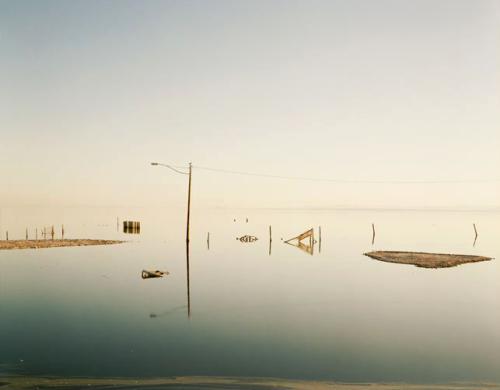
submerged lamppost
Salton Sea, California, 1985
Richard Misrach 1 2
_______________________
“Night Visit”
Emmanuel Bove
translated by Alyson Waters
asymptote
What was making me sad? My books—all my books—were sleeping on the shelves. No one had spoken badly of me. My family and friends had no particular worries. I found myself in the midst of all things. So I did not need to fear that events, in my absence, would take a turn I would be unable to change. I was not unhappy with myself. And, even had I been, this intensity of feeling was different.
(....)
I was dozing in an armchair. At the seam where the red velvet meets the wood, golden tacks form a border. One of them was missing and, there, the edge sagged a bit. I sat motionless. My hand tugged at this seam without my being aware of it, as it sought unconsciously to pull out the next tack.
It was only once I had managed to pull it out that I became aware of what I was doing. I felt a small joy at this discovery, as I feel each time I catch myself doing something without realizing it, or when I bring to light a sensation in me of which I was unaware. It makes me as happy as a ray of sunshine or a kind word. Anyone who would criticize me for this tiny joy will never understand me. I think that seeking knowledge of oneself is a pure deed. To criticize me for digging too deep into myself would be to criticize me for being happy.
I have to say, though, that this joy is very fragile. It really is not equal to the joy a ray of sunshine gives us. Quickly it disappears, and I have to look for something else inside me to bring it back to life. Then, in the intervals, it seems that everything is hostile to me and that the people around me, with their simple joy, are in reality happier than I am.
...(more)
|
